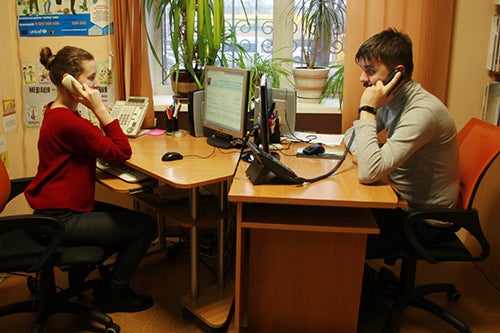News
When quarantine is unsafe: Domestic violence survivors seek help in Ukraine
- 15 April 2020
News
KYIV, Ukraine – One by one, countries facing lockdowns and movement restrictions due to the COVID-19 pandemic are reporting alarming increases in domestic abuse. For too many women, safety from the virus is not safety from violence.
Ukraine is no exception.
Even under normal circumstances, violence against women and girls is a serious problem, experts say. Today, this violence seems to be escalating, along with mental health concerns, as families struggle with anxiety, economic stress and close quarters.
The number of calls to the National Hotline on Combatting Domestic Violence increased by almost 26 per cent in the first two weeks of quarantine compared to the prior two-week period.
And at five crisis centres established by UNFPA, the number of clients seeking urgent support for mental health and psychosocial issues has exploded. The beginning of April saw a 113 per cent increase in clients compared to the beginning of March.
It may not be safe for women to call hotlines from their homes, where an abuser may overhear, said Alona Krivuliak, director of the Hotlines Department at La Strada, the NGO that runs the hotline. They are are trying to offer alternatives.

“During the quarantine period, a phone call to the hotline itself can prompt partner aggression… You can get help via Skype, our Facebook messenger, through email or a feedback form on our website,” she said.
The hotline offers psychological support, legal information, and counselling. Counsellors can also refer women to shelters or protection services.
Over the last four years, UNFPA has supported the hotline in providing assistance around the clock. Records show that 63 per cent of all calls come in at night, when it may be safer for survivors to reach out. This trend has remained true during the quarantine period.
Abusers also call the helpline, mostly at night. Since the quarantine period, about 4 per cent of the calls have come from abusers.
Counsellors welcome these calls. They can offer help to people struggling with anger and despair, crafting individual plans to help callers manage their anger and change patterns of abusive behaviour.
Other services are grappling with the pandemic response, as well.
The five UNFPA-established crisis centres – which provide support to both men and women, and are now largely run by municipalities – are trying to minimize in-person consultations. Where possible, they are providing psychosocial support and social services via telephone.
Out of nine shelters established by UNFPA, eight remain open. One, in Mariupol, stopped accepting new clients following a decision by the local authorities. For new survivors to be admitted to a shelter, they must obtain a medical certificate and a physician’s assessment that they are free of COVID-19 symptoms. Those with symptoms are admitted to a health facility.
Six mobile psychosocial teams – part of UNFPA’s efforts to assist combatants and their families in the Kyiv and Mykolaiv oblasts – continue to provide services through Skype, Viber, telephone and online support groups. These efforts are designed to help current and former combatants overcome challenges related to their experiences in conflict and reduce the overall incidence of domestic violence.
The share of phone consultations increased from 69 per cent at the beginning of March to 85 per cent one month later. Julia Mudra, a psychologist with one of these mobile teams, recalled a recent case she addressed over the phone rather than in person, due to the pandemic.
“A woman turned to us for help,” said Ms. Mudra. “There was an emotional strain in relations with her husband, who is the military serviceman. She had our phone number from one of our previous scheduled visits, and she decided to call us before the situation with her husband gets worse. We immediately started working with their family. This allowed to steer clear of physical violence situations and helped stabilize their relationship.”
UNFPA’s efforts to address gender-based violence and domestic abuse in Ukraine are supported by the governments of Canada, Estonia and the United Kingdom.
Today, with more than 3,300 confirmed cases of COVID-19 in Ukraine, authorities and UNFPA are taking the pandemic very seriously. But even in these challenging times, they say, the needs of the most vulnerable must not be forgotten.